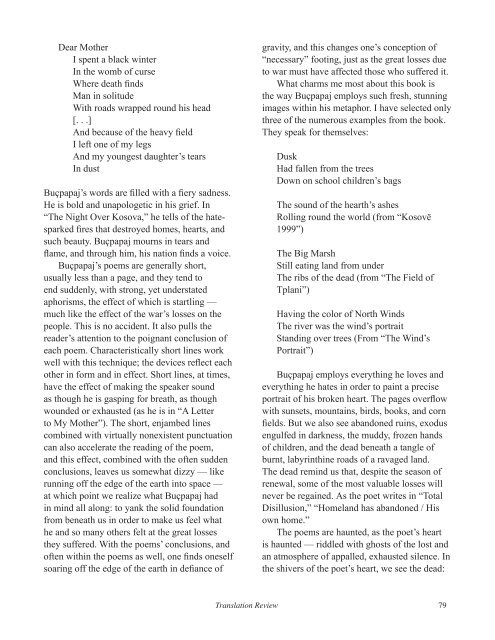Table of contents - The University of Texas at Dallas
Table of contents - The University of Texas at Dallas
Table of contents - The University of Texas at Dallas
Create successful ePaper yourself
Turn your PDF publications into a flip-book with our unique Google optimized e-Paper software.
Dear Mother<br />
I spent a black winter<br />
In the womb <strong>of</strong> curse<br />
Where de<strong>at</strong>h finds<br />
Man in solitude<br />
With roads wrapped round his head<br />
[. . .]<br />
And because <strong>of</strong> the heavy field<br />
I left one <strong>of</strong> my legs<br />
And my youngest daughter’s tears<br />
In dust<br />
Buçpapaj’s words are filled with a fiery sadness.<br />
He is bold and unapologetic in his grief. In<br />
“<strong>The</strong> Night Over Kosova,” he tells <strong>of</strong> the h<strong>at</strong>esparked<br />
fires th<strong>at</strong> destroyed homes, hearts, and<br />
such beauty. Buçpapaj mourns in tears and<br />
flame, and through him, his n<strong>at</strong>ion finds a voice.<br />
Buçpapaj’s poems are generally short,<br />
usually less than a page, and they tend to<br />
end suddenly, with strong, yet underst<strong>at</strong>ed<br />
aphorisms, the effect <strong>of</strong> which is startling —<br />
much like the effect <strong>of</strong> the war’s losses on the<br />
people. This is no accident. It also pulls the<br />
reader’s <strong>at</strong>tention to the poignant conclusion <strong>of</strong><br />
each poem. Characteristically short lines work<br />
well with this technique; the devices reflect each<br />
other in form and in effect. Short lines, <strong>at</strong> times,<br />
have the effect <strong>of</strong> making the speaker sound<br />
as though he is gasping for bre<strong>at</strong>h, as though<br />
wounded or exhausted (as he is in “A Letter<br />
to My Mother”). <strong>The</strong> short, enjambed lines<br />
combined with virtually nonexistent punctu<strong>at</strong>ion<br />
can also acceler<strong>at</strong>e the reading <strong>of</strong> the poem,<br />
and this effect, combined with the <strong>of</strong>ten sudden<br />
conclusions, leaves us somewh<strong>at</strong> dizzy — like<br />
running <strong>of</strong>f the edge <strong>of</strong> the earth into space —<br />
<strong>at</strong> which point we realize wh<strong>at</strong> Buçpapaj had<br />
in mind all along: to yank the solid found<strong>at</strong>ion<br />
from bene<strong>at</strong>h us in order to make us feel wh<strong>at</strong><br />
he and so many others felt <strong>at</strong> the gre<strong>at</strong> losses<br />
they suffered. With the poems’ conclusions, and<br />
<strong>of</strong>ten within the poems as well, one finds oneself<br />
soaring <strong>of</strong>f the edge <strong>of</strong> the earth in defiance <strong>of</strong><br />
gravity, and this changes one’s conception <strong>of</strong><br />
“necessary” footing, just as the gre<strong>at</strong> losses due<br />
to war must have affected those who suffered it.<br />
Wh<strong>at</strong> charms me most about this book is<br />
the way Buçpapaj employs such fresh, stunning<br />
images within his metaphor. I have selected only<br />
three <strong>of</strong> the numerous examples from the book.<br />
<strong>The</strong>y speak for themselves:<br />
Dusk<br />
Had fallen from the trees<br />
Down on school children’s bags<br />
<strong>The</strong> sound <strong>of</strong> the hearth’s ashes<br />
Rolling round the world (from “Kosovë<br />
1999”)<br />
<strong>The</strong> Big Marsh<br />
Still e<strong>at</strong>ing land from under<br />
<strong>The</strong> ribs <strong>of</strong> the dead (from “<strong>The</strong> Field <strong>of</strong><br />
Tplani”)<br />
Having the color <strong>of</strong> North Winds<br />
<strong>The</strong> river was the wind’s portrait<br />
Standing over trees (From “<strong>The</strong> Wind’s<br />
Portrait”)<br />
Buçpapaj employs everything he loves and<br />
everything he h<strong>at</strong>es in order to paint a precise<br />
portrait <strong>of</strong> his broken heart. <strong>The</strong> pages overflow<br />
with sunsets, mountains, birds, books, and corn<br />
fields. But we also see abandoned ruins, exodus<br />
engulfed in darkness, the muddy, frozen hands<br />
<strong>of</strong> children, and the dead bene<strong>at</strong>h a tangle <strong>of</strong><br />
burnt, labyrinthine roads <strong>of</strong> a ravaged land.<br />
<strong>The</strong> dead remind us th<strong>at</strong>, despite the season <strong>of</strong><br />
renewal, some <strong>of</strong> the most valuable losses will<br />
never be regained. As the poet writes in “Total<br />
Disillusion,” “Homeland has abandoned / His<br />
own home.”<br />
<strong>The</strong> poems are haunted, as the poet’s heart<br />
is haunted — riddled with ghosts <strong>of</strong> the lost and<br />
an <strong>at</strong>mosphere <strong>of</strong> appalled, exhausted silence. In<br />
the shivers <strong>of</strong> the poet’s heart, we see the dead:<br />
Transl<strong>at</strong>ion Review 79

















